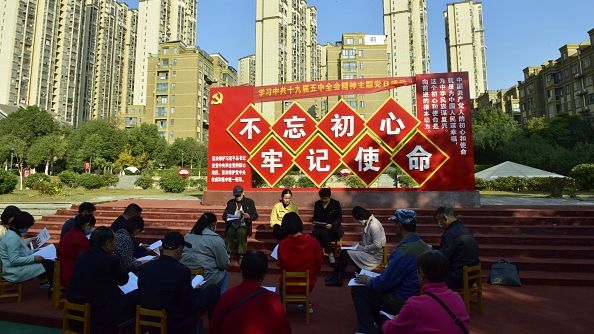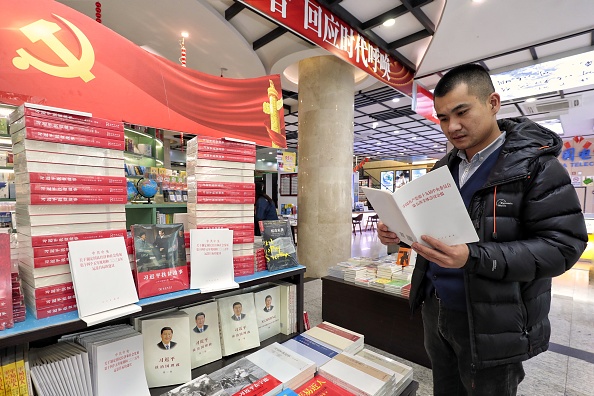
Party members study the spirit of the fifth Plenary Session of the 19th CPC Central Committee in Hefei, Anhui Province, China, November 13, 2020. /Getty
Party members study the spirit of the fifth Plenary Session of the 19th CPC Central Committee in Hefei, Anhui Province, China, November 13, 2020. /Getty
Editor's note: Stephen Ndegwa is a Nairobi-based communication expert, lecturer-scholar at the United States International University-Africa, author, and international affairs columnist. The article reflects the author's opinions, and not necessarily the views of CGTN.
One of the most popular Chinese sayings states that "a journey of a thousand miles begins with a single step." This ancient proverb aims at motivating those who are on the verge of giving up before undertaking a literally long journey or those still procrastinating in taking the initiative on an arduous task.
No one understands the meaning of this saying better than the Communist Party of China (CPC), which in 2021 marks a centenary since its formation. Founded in 1921, the CPC, otherwise known as the Chinese Communist Party, is the founding and ruling political party of the People's Republic of China.
Chinese President Xi Jinping recently asked China's citizens to learn the history of the CPC during a mobilization meeting on Party history learning and education in Beijing. "Learning the Party history is an effective way in upholding and developing socialism with Chinese characteristics in the new era and in advancing the Party's self-evolution and maintaining its vitality forever."
As it happens when marking an anniversary, especially one as long as a hundred years of the CPC, it is time for reflection, taking stock of the past, and using the lessons learned to inform future action. With success, however, there is usually a temptation to slacken things somewhat on the way forward. Therefore, Xi's appeal for the review of CPC's history is a way of ensuring that people do not forget the tough road traveled in arriving at the comfortable status quo.
The CPC has also engaged in soul-searching in order to continue forging and maintaining the party's good conduct, a trait that is essential in serving the people fully. President Xi has also led from the front in various efforts to overcome challenges and achieve the Party's development targets expeditiously by traveling to every nook and cranny of the country to evaluate projects.

A reader buys books related to the fifth Plenary Session of the 19th CPC Central Committee in Front of a counter at Xinhua Bookstore in Zhangjiagang, East China's Jiangsu Province, November 20, 2020. /Getty
A reader buys books related to the fifth Plenary Session of the 19th CPC Central Committee in Front of a counter at Xinhua Bookstore in Zhangjiagang, East China's Jiangsu Province, November 20, 2020. /Getty
The CPC has led China in achieving one of its greatest feats. By defeating extreme poverty in 2020, the country has managed to build a moderately prosperous society in all respects. The next leap in this journey of a thousand miles now is the phase of building a fully-fledged modern socialist country as contained in the CPC Central Committee's proposals for the formulation of the 14th Five-Year Plan (2021-2025) for National Economic and Social Development and the Long-Range Objectives Through the Year 2035.
But contrary to popular belief that China is a single party state, there are several other political parties that support the CPC in driving the country's socio-economic and political agenda. The difference is that they offer support rather than operating.
Of course, those who do not know their history are bound to repeat their mistakes. It is not perchance that China has pulled itself up by its bootstraps to the current geopolitical pole position. A lot of sacrifices have been made by party leaders and collectively by the citizens in order for the country to be the second-largest economy in the world.
In his book "The Governance of China", Xi presents vital lessons on how the CPC transformed the concept of governance into tangible benefits for the Chinese. The book offers invaluable lessons on the transformation and building of resilient societies through home-grown governance solutions.
One of the greatest achievements that the world can learn from CPC's governance is the effective handling of the COVID-19 pandemic since it erupted in 2019. While many countries were still dilly-dallying even after the World Health Organization declared coronavirus a pandemic of global concern, the world was treated to images of the CPC-led government rising to the occasion in a resolute manner and instituting strict measures to contain its spread.
The curbing of the pandemic on its tracks was enabled by strong and disciplined management of public affairs that ensures everyone is playing their role or roles accountably for the greater good and not to fulfill selfish ends at the expense of others. The CPC has been the main factor behind the decades-long industriousness, optimism and self-reliance of the Chinese people.
But China acknowledges the fact that the CPC model is not a one-size-fits-all model of governance and, unlike the proponents of Western democracy, does not coerce other countries or even partners to adopt the system. True democracy should always strive towards building a consensus in tackling common challenges rather than act as a cacophony of dissenting voices that distorts outcomes.
No one can argue against the fact that the CPC embodies extraordinary virtues which have undoubtedly resulted in the reality of the Chinese dream. Ultimately, the CPC has shown that, after all, good governance is all about service to mankind and not a tool for power plays.
(If you want to contribute and have specific expertise, please contact us at opinions@cgtn.com)

